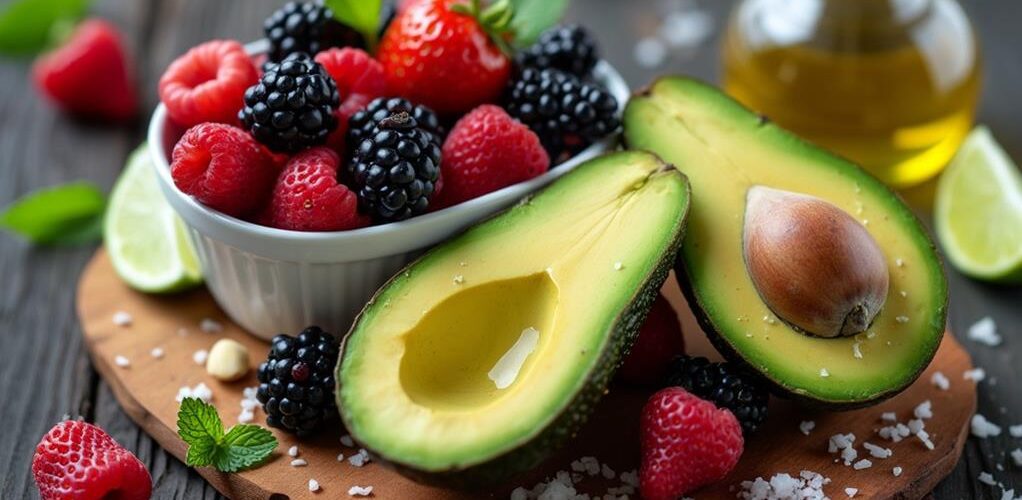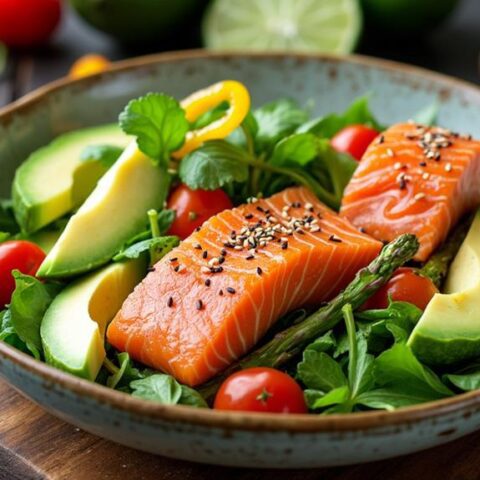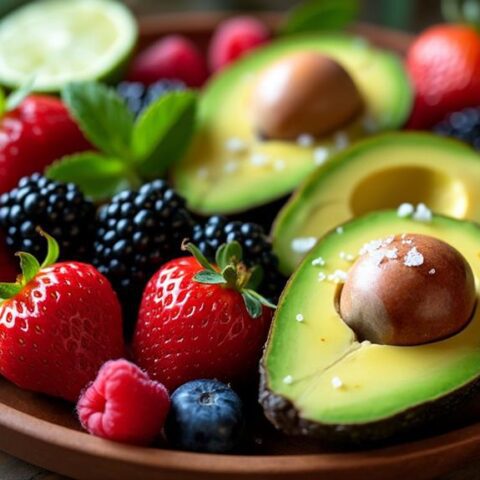
For those adhering to a keto diet, certain fruits offer tasty and nutritious options. Avocados are a standout, with low net carbs and beneficial monounsaturated fats. Berries such as raspberries and blackberries are high in fiber and antioxidants but low in net carbohydrates. Lemons, with their minimal carb content, enhance flavors and provide vitamin C. Tomatoes, not your typical fruit, are rich in lycopene and low in carbs, making them versatile in various dishes. Finally, watermelon, though higher in carbs, can be enjoyed in moderation, offering hydration and vitamins. Discover how these fruits seamlessly fit into a keto regimen.
Key Takeaways
- Avocados are nutrient-dense with low net carbs, making them ideal for ketogenic diets.
- Berries like raspberries and blackberries offer low net carbs and high antioxidants.
- Lemons are keto-friendly with only 4 grams of net carbs and rich in vitamin C.
- Tomatoes contain lycopene and are low in carbs, perfect for keto recipes.
- Watermelon, when consumed in moderation, offers hydration and essential vitamins.
Avocados
Although often mistaken for a vegetable, avocados are a nutrient-dense fruit that aligns well with a ketogenic diet due to their unique macronutrient composition. Incorporating avocados can contribute to enhanced appetite control, as their healthy fat content promotes satiety.
With approximately 8.5 grams of carbohydrates per 100-gram serving, avocados boast a low net carb count of about 1.5 grams, thanks to their high fiber content of nearly 7 grams. This makes them a suitable choice for those adhering to low-carb, high-fat dietary regimens like the keto diet.
The avocado benefits extend beyond their favorable carbohydrate profile. They are rich in heart-healthy monounsaturated fats, providing approximately 15 grams of these fats per 100 grams. This healthy fat content not only supports cardiovascular health but also promotes satiety, potentially aiding in calorie management.
In addition, avocados are an excellent source of essential vitamins and minerals, including vitamin K, vitamin C, potassium, and folate, contributing to overall nutritional balance.
Incorporating avocados into keto-friendly meals is both delicious and nutritious. Avocado recipes are versatile, enhancing dishes from salads to smoothies with their creamy texture and rich flavor. Their inclusion not only enhances taste but also boosts the nutritional profile of meals, making them an invaluable component of a ketogenic diet.
Berries
When it comes to keto-friendly fruits, berries stand out due to their low net carbohydrate content and nutritional benefits. Raspberries, strawberries, and blackberries are particularly advantageous for those following a ketogenic diet. Raspberries offer approximately 7 grams of net carbs per cup, making them an ideal choice for maintaining low carbohydrate intake. Strawberries provide around 8.7 grams of net carbs per cup and are rich in vitamin C and antioxidants, promoting overall health and satisfying sweet cravings without jeopardizing ketosis. Blackberries, with about 6.4 grams of net carbs per cup, are high in fiber, supporting digestive health.
The nutritional composition of these berries is outlined below:
| Berry Type | Net Carbs (per cup) | Key Nutrients |
|---|---|---|
| Raspberries | 7 grams | High in fiber |
| Strawberries | 8.7 grams | Vitamin C, Antioxidants |
| Blackberries | 6.4 grams | Fiber, Anthocyanins |
The berry benefits extend beyond their macronutrient profiles. Their antioxidant properties, particularly high levels of anthocyanins, help reduce inflammation and support heart health. Incorporating berries into keto-friendly dishes can be both simple and rewarding. For example, mixing them into low-carb yogurt or incorporating them into berry recipes like keto-friendly smoothies can enhance both flavor and nutrition.
Lemons
While berries are renowned for their keto-friendly attributes, lemons also deserve attention for their low carbohydrate content and nutritional benefits. With approximately 4 grams of net carbs per fruit, lemons are a suitable option for those adhering to a ketogenic diet.
Beyond their carbohydrate profile, lemons offer an array of health benefits. They are a rich source of vitamin C, delivering 30-40% of the daily recommended intake, which is essential for immune function and skin health. Additionally, at about 17 calories per fruit, lemons allow for flavor enhancement without greatly impacting caloric intake.
The lemon benefits extend to digestive health and kidney stone prevention, thanks to their citric acid content. This makes them not only a dietary preference but a functional food with potential health advantages. Furthermore, lemons support metabolic health by enhancing insulin sensitivity, which is vital for those managing type 2 diabetes. Incorporating lemons into your diet can be both delicious and beneficial.
Consider these ideas for incorporating lemons into your keto meal plan:
- Use lemon juice to add zest to salads and marinades.
- Incorporate lemon zest in keto-friendly baked goods.
- Blend lemon juice with water for a revitalizing drink.
- Create a lemon-infused olive oil for drizzling over vegetables.
These lemon recipes offer diverse applications, enhancing both taste and nutritional value.
Tomatoes
Among the diverse range of keto-friendly fruits, tomatoes stand out due to their nutritional profile and low carbohydrate content. Classified as a fruit, a medium-sized tomato contains approximately 4.78 grams of carbohydrates, making it a suitable choice for those following a ketogenic diet.
The tomato benefits extend beyond just its carbohydrate content. It is rich in essential vitamins, providing approximately 24% of the daily value for vitamin C and a significant amount of vitamin K, both of which are essential for overall health. Tomatoes can also play a role in improved insulin sensitivity, which is beneficial for managing type 2 diabetes as part of a ketogenic diet.
Tomatoes are also an excellent source of lycopene, a potent antioxidant linked to reduced risks of heart disease and certain cancers. This makes them not only a low-carb option but also a health-promoting one.
The fiber content, around 1.5 grams per medium tomato, supports digestive health and contributes to feelings of fullness, making them ideal for weight management within the keto framework.
Incorporating tomatoes into keto recipes can be both simple and delicious. A cup of cherry tomatoes, containing roughly 4 grams of net carbs and under 30 calories, can effortlessly enhance salads or serve as a revitalizing snack, ensuring variety and satisfaction in a keto diet.
Watermelon
Tomatoes, with their impressive nutritional benefits, set a high standard for keto-friendly fruits, and watermelon follows suit with its unique attributes.
Watermelon is a revitalizing choice for those adhering to a ketogenic diet, offering approximately 11.5 grams of net carbs per one-cup serving (152 grams). This makes it a viable option for satisfying sweet cravings without exceeding daily carbohydrate limits.
Rich in vitamins C and A, watermelon contributes to immune and skin health through its antioxidant properties. Additionally, its high water content—about 92%—makes it an excellent hydration source, an essential aspect of maintaining balance on a keto diet.
Like keto-friendly vegetables such as spinach and kale, watermelon can be enjoyed without disrupting ketosis when consumed in moderation.
Watermelon benefits extend to its lycopene content, an antioxidant associated with reduced inflammation and potential heart health improvements. Incorporating watermelon recipes into a keto regimen can enhance dietary variety while supporting these health benefits.
- Low-carb content: 11.5 grams of net carbs per cup
- Rich in antioxidants: Vitamins C, A, and lycopene
- Hydration support: 92% water content
- Sweet satisfaction: Helps curb cravings without carb overload
In moderation, watermelon serves as a delightful and beneficial addition to a keto-friendly diet, merging taste with notable health advantages.
Frequently Asked Questions
What Is the Most Keto-Friendly Fruit?
The most keto-friendly fruit is the avocado, offering significant keto fruit benefits. It is a low carb fruit with only 1.5 grams of net carbs per 100 grams, supporting dietary goals while providing essential nutrients and fiber.
Can You Go Into Ketosis if You Eat Fruit?
Entering the ketosis process is possible while consuming specific fruit types. By selecting low-carb options like avocados or berries and practicing portion control, individuals can maintain ketosis, as these fruits minimally impact daily carbohydrate allowances.
Can I Eat Fruit on Keto and Still Lose Weight?
Yes, consuming fruit on a keto diet is feasible without hindering weight loss, provided you select low-carb options like avocados and berries. These keto fruit benefits include essential nutrients and antioxidants while maintaining ketosis through portion control.
What Fruit Is Good for Keto Breakfast?
For a keto breakfast, consider avocados and berries as low carb toppings, or incorporate lemons and coconut into a keto smoothie. These fruits provide essential nutrients while maintaining ketosis due to their low net carbohydrate content.
Conclusion
To sum up, the incorporation of certain fruits into a ketogenic diet can be both nutritionally beneficial and aligned with dietary guidelines. Avocados provide healthy fats and fiber, while berries offer antioxidants and essential vitamins. Lemons contribute vitamin C and enhance flavor without significant carbohydrate impact. Tomatoes supply crucial nutrients like lycopene, and watermelon, though higher in carbohydrates, can be consumed in moderation. These fruits collectively support a balanced approach to maintaining a low-carbohydrate lifestyle.









No Comments